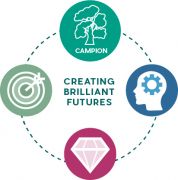Computer Science and Information Technologies
Statement of intent
“The purpose of our computer science curriculum is to develop the knowledge, understanding and skills to enable our students to develop creative solutions to problems they will face in everyday life. Computer Science prepares out students to make an informed decision about the technology they use and to choose whether to “program or be programmed” [Douglas Rushkoff 2010]. Computer Science will impact every area of our students’ lives, we provide them with the skills to understand and interpret how the changes, that will increase, will affect their lives, and how they can participate in those changes.
The curriculum covers 3 key areas:
- Computer Literacy. This topic ensures that students understand how to use information technology (IT) in an appropriate way. It ensures that students can use IT safely and to be able to navigate the world of computers. Using information they retrieve from the internet, and other sources, in a safe and legal way; understanding the consequences of their actions.
- Computer Science. This subject covers the way computers function. It gives the students a knowledge an understanding of how a computer functions. For example, how the central processor carries out instructions, how all data, documents, images are saved using just ones and zeros.
- The third and most creative element of the subject is ‘Computational Thinking’. This topic provides the skills to define, analyse, design, develop and evaluate a solution to a problem. We learn how to program, not just the language, but the techniques required in order to develop robust programs which are both logically and syntactically correct. To achieve these things, we use professional tools and the languages of the commercial world.
Computer Science is the subject which prepares our students for the future.”
Curriculum map
|
Year |
Term 1 |
Term 2 |
Term 3 |
|
Year 7
|
E-safety and the use of school systems. What is a computer and hardware |
Software, operating and application software. Computer memory and storage |
Moral, legal and ethical issues. Units of computer memory Images / Sound and Text |
|
Year 8
|
Algorithms. Flow charts, binary values and binary addition |
Introduction to programming and python |
Boolean Logic and logic gates |
|
Year 9
|
Web sites, function and purpose. Planning and designing a website. Developing a website from scratch |
Standard algorithms (Sorting and searching).
Intermediate python (loops, selection, functions) |
Development of game. Libraries, validation Preparation for KS4 Developing algorithms to solve problems. |
|
Year 10 OCR J277
|
Systems Architecture Standard algorithms |
Networking System and Network threats Developing algorithms to solve problems |
Operating and application software. Legal, moral, ethical and environmental issues |
|
Year 11 OCR J277 |
Programming techniques. Robust development |
OCR Programming project. |
Revision
|
|
Year 12 OCR H446 |
Systems Architecture Software development |
Data exchange. Data types and structures |
Legal Ethical issues
|
|
Algorithms and Programming Techniques.
|
|||
|
Year 13 OCR H446
|
Coursework
|
Revision
|
Revision |
|
Programming Project: apply the principles of computational thinking to a practical coding programming project. Students will analyse, design, develop, test, evaluate and document a program written in a suitable programming language. |
Students will complete the OCR J277 Computer Science course at GCSE. At A-Level they will complete the H446 Computer Science course.
By studying this subject, students will develop:
-
an understanding of and ability to apply the fundamental principles and concepts of computer science including;
- abstraction
- decomposition
- logic
- algorithms
- data representation
- the ability to analyse problems in computational terms through practical experience of solving such problems including writing programs to do so
- the capacity for thinking creatively, innovatively, analytically, logically and critically
- the capacity to see relationships between different aspects of computer science
- mathematical skills
- the ability to articulate the individual (moral), social (ethical), legal and cultural opportunities and risks of digital technology improve numeracy and literacy skills
Career options:
Studying this subject may lead to a wide variety of career paths, including those involving project management; systems design and development; network management; web-site development; games design and development.
Head of Faculty



